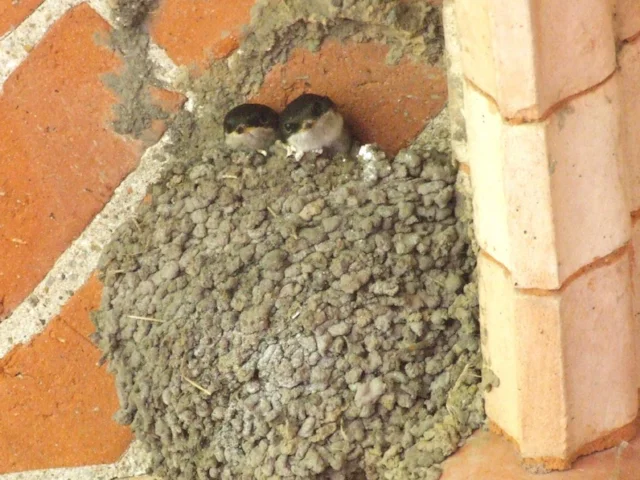Help protect House Martin nests
0fbc0962-98aa-427b-ad9d-a64a0061cc0e

The RSPB are asking the public to protect House Martin nests by reporting anyone who removes them during the breeding season.
House Martins can be seen building their almost spherical mud nests on the sides of houses or farm buildings, usually just under the eaves in a sheltered corner, or on a southerly facing wall to get the warmth of the sun.
A House Martin nest is painstakingly constructed from hundreds of clumps of wet mud mixed with straw and grass to make a closed cup shape, with just a small hole as an entrance and exit. Adult birds will fix old nests and add to them, often using the same nest year after year.
House Martins arrive in Britain fairly late in the breeding season toward the end of April, and they can have up to three broods during the summer. With this late arrival and with chicks to raise, the juveniles can be seen feeding on insects as late as October. The adults and young fatten up before they fly back to sub-Saharan Africa, where they spend the winter.
House Martin is Amber-listed as a Bird of Conservation Concern, so it’s important that their nest sites are protected. However, the RSPB often receives calls in summer from householders who are worried about House Martins building muddy nests on their homes, or from businesses who think they need to get rid of the nests for health and safety reasons. They stress that these nests are only used for a few months each year and pose no harm to human health.
If a nest is in use, it is protected by wildlife law and should not be removed. Anyone doing so risks being prosecuted for a wildlife crime, which carries a maximum sentence of up to six months imprisonment and/or a £5,000 fine.
If you suspect a wildlife crime has been committed, the charity requests that the public report it to Crimestoppers anonymously on 0800 555 111.
House Martins can be seen building their almost spherical mud nests on the sides of houses or farm buildings, usually just under the eaves in a sheltered corner, or on a southerly facing wall to get the warmth of the sun.
A House Martin nest is painstakingly constructed from hundreds of clumps of wet mud mixed with straw and grass to make a closed cup shape, with just a small hole as an entrance and exit. Adult birds will fix old nests and add to them, often using the same nest year after year.
House Martins arrive in Britain fairly late in the breeding season toward the end of April, and they can have up to three broods during the summer. With this late arrival and with chicks to raise, the juveniles can be seen feeding on insects as late as October. The adults and young fatten up before they fly back to sub-Saharan Africa, where they spend the winter.
House Martin is Amber-listed as a Bird of Conservation Concern, so it’s important that their nest sites are protected. However, the RSPB often receives calls in summer from householders who are worried about House Martins building muddy nests on their homes, or from businesses who think they need to get rid of the nests for health and safety reasons. They stress that these nests are only used for a few months each year and pose no harm to human health.
If a nest is in use, it is protected by wildlife law and should not be removed. Anyone doing so risks being prosecuted for a wildlife crime, which carries a maximum sentence of up to six months imprisonment and/or a £5,000 fine.
If you suspect a wildlife crime has been committed, the charity requests that the public report it to Crimestoppers anonymously on 0800 555 111.

